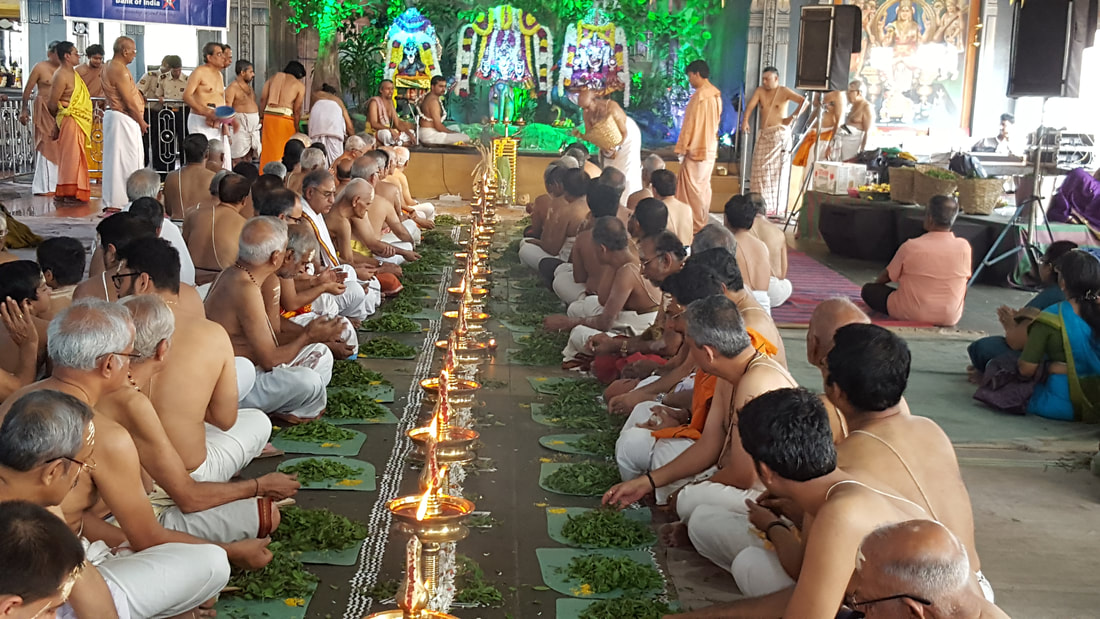|
Why Prayer or Worship
Why prayer or worship? Many people pray to fulfil their desires, some people pray as ritual i.e. habitually, some people pray out of fear and very minuscule people pray out of love and affection to the deity. Prayer may be done as per prescribed procedure by the respective religion or by simply meditating. In Sanskrit language, the word for prayer is prarthana. It is formed by combining words, ‘pra’ meaning ‘intensely’ and ‘artha’ meaning ‘to plead’. Hinduism is most dynamic religion having widest range of prayers or worships to suit individual temperament and preferences. Worship is not fixed to locations or timings. Hindus worship personal deities to fulfil individual desires or formless Supreme Being to integrate the body, the mind and the Atman in order to evolve into a higher being. While worshipping the Ishta Devata (most loved deity), the person chants and reminds his attributes so that these attributes are imbibed. The classical approaches in Hinduism are Raja, Jnana, Karma, and Bhakti Yoga, as well as Hatha, Kriya, Kundalini, Laya, Mantra, Nada, Siddha, and Tantra Yoga. Meditation, contemplation, mantra and prayer finally converge into a unified force directed towards the final stage, piercing the pearl of wisdom called bindu, leading to the Absolute. Why Prayer and Prayer room: Various rituals and techniques of prayer in Hinduism play an important role in enhancing physical health, mental serenity and establishing connection with Supreme Consciousness. Scientific studies have been conducted to investigate the healing effects of prayers. The role of prayers and prayer room can be enlisted as follows:
Why & what are the different types of Prayers: Hinduism has devised diversified types of prayers or worships depending on the pre-dominance of intellect, mind, determination or physical activities which can be classified as under: 1. For Persons of high emotions:
2. For Persons of strong will power and high discipline: a. Dharna, Dhayan and Samadhi. b. Japa of Mantras which is sacred syllable or set of syllables (Please see a detailed article on “Chanting of Mantra” on this website under the category of Puja). c. Tapas i.e. austerity or Penance or fasting.
3. For Person who is activity oriented: a. Ritual worship i.e. lighting & waving of the lamp, burning incense sticks, offering food, Arti, prostrating in front of god, reading chalisa of deities (Shiv Chalisa, Hanuman Chalisa, Durga Chalisa etc.) to invoke, praise and asking him/her to help and remove all obstacles and hardships on the path to fulfilment, pronouncing 108 sacred names of the deities reminding their qualities, chanting mantras (moola mantra, beej mantra, gayatri mantra, etc.) having divine powers etc. b. Yajna & Havan c. Pilgrimage to holy places d. Circumambulation of a temple 4. For Persons of intellect: a. Reading of religious books (Ramcharitramanas, Bhagwat Geeta, Shad Darshan, Upnishads, etc) regularly to imbibe knowledge to understand moral & religious duties and clear doubts of life and moksha. b. Listening or Sravana of spiritual texts, c. Contemplation or Manana of spiritual teachings, d. Nididhyasana or practice is a rational & cognitive process by which intellectual conscience is transformed into stillness, a calm in which the soul lays itself open to the Divine. Why worship of Sakar forms or Nirakar Supreme Being: All religions have images to worship which may be Gurugranth Sahib, Cross with Jesus hanging on it or Mother Mary, holy Kabaa, Arc & torah, Buddha or Mahavira or Tirthankaras. Hinduism is a monotheistic religion which believes that God manifests Himself or Herself in several forms. One is supposed to worship the form that is most appealing to the individual without being disrespectful to other forms of worship. Vedanta holds the view that Brahman is cosmic consciousness (Sat-Chit-Ananda – Truth-Consciousness-Bliss) who creates universe – jivatma & physical universe, maintains and withdraws within it. However, Hinduism recognised various needs and desires of human being and to fulfil them various deities & forms are invoked. Though supreme God is nirakar (formless), it manifest in many forms to fulfil the needs. (Please see a detailed article on “what is God under Hinduism” on this website under the category of Principles). What do Hindu Prayers invoke?
0 Comments
|
Archives
July 2024
Categories |

 RSS Feed
RSS Feed